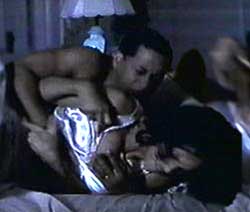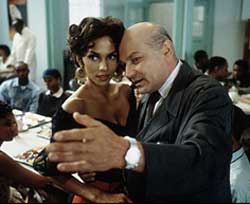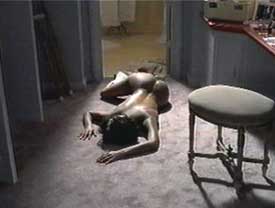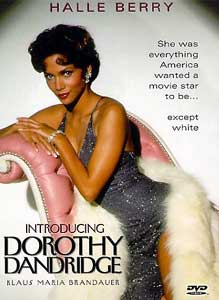Halle Barry stars in the title role for the made-for-cable biopic Introducing Dorothy Dandridge (1999). It's framed a little confusingly as a series of flashback remembrances while Dorothy, on her last night on earth, tells her own story on the phone to her ex-sister-in-law Geri Nicholas (Tamara Taylor), simultaneously "scrapbooking" a collection of photos & clippings.
 The film is badly enough edited that many may never figure out who she's talking to on the phone throughout, & the nature of the conversation isn't the least bit probable, but it provides the excuse & the frame to present her biography. The film is badly enough edited that many may never figure out who she's talking to on the phone throughout, & the nature of the conversation isn't the least bit probable, but it provides the excuse & the frame to present her biography.
The film requires a bit of forgiveness for its cable budget & mediocre script & inadequate editing & uninspired direction all more suited to serial television drama than a feature film. Still, with enough patience, the subject eventually comes through.
It begins with the act billed as The Dandridge Sisters at the Cotton Club, on a day when Dorothy first met the Nicholas Brothers, one of whom, Harold (Obba Babatunda), eventually to become her spouse in a failed teen marriage. The "sister act" consisted of Dorothy & her sister Vivian (Cynda Williams), plus Etta Jones (Sharon Brown).
They'd been performing since childhood first in churches then on the chitlun circuit finally in good nightclubs, with even a couple of film gigs. The act was managed by their mother's lover (LaTanya Richardson), a cruel dyke who according to this version of events violently molested Dorothy & was the cause of her screwed up sex life with men forever after.
The pat psychology is definitely being fudged for fictional effect. The probability is that Geneva Williams (unnamed in the fictionalized account) did molest Dorothy as a young teenager, but not the violent act concocted for the film. The reality is rebellious Dorothy finally beat the living daylights out of "aunty" & set out on her own at age sixteen. She was not the frail eternally traumatized victim the film prefers from start to finish of the tale.
Her mother Ruby Dandridge (Loretta Devine) had her own career playing mammies & maids in B movies, & was neglectful of her girls. But the film prefers to make her quite a pleasant mom, whom the girls preposterously protect from knowledge of "Aunty's" abuses.
The film has a streak of perversity in that having this downright sexploitation scene of lesbian rape & sexual terror, it will soon be recreated with Harold Nicholas on their wedding night when Dorothy responds to normal sexual relations as a terrorizing act of rape. In a film generally superficial, finding plenty of screen time for cable porn diminishes the film's integrety.
The authors preferred a borderline mentally ill Dandridge as frigid beauty who could not take care of herself but fell for all the wrong kinds of men. There's some truth to it but it's exaggerated, & to sustain this exaggeration, Dorothy's many moments of bravery & her general independence & career determination are undermined in favor of the idea that she needed to be handled with kid gloves or she sabotaged herself.
The impression given of her abject loneliness may have had some emotional truth, but she was not friendless as the film conveys. Nor did the racism of the world & her own supposed mental problems keep her from having a successful career. If she'd been satisfied with the success of nightclub act, her career would have had to have been defined as fabulously successful. It's true, however, she wanted to be a movie star, & there just weren't enough substantial roles for black women in her day.
Dorothy's real-life struggles in behalf of her severely retarded daughter were heroic, but the film would have her a failure at home care, fobbing the child off on an institution, then losing all parental rights, her sadnesses being mainly connected to her own ineptitude as a parent. This is very unfair to Dorothy's memory, a very negative slant to issues she essentially faced without help.
 And we see her whining & throwing tantrums like a spoiled brat over Jim Crow racism, which she can survive only because of the soothing deep concern of her hand-holding white manager Earl Mills, surprisingly well played by Brent Spiner. And we see her whining & throwing tantrums like a spoiled brat over Jim Crow racism, which she can survive only because of the soothing deep concern of her hand-holding white manager Earl Mills, surprisingly well played by Brent Spiner.
The fictionalizing slant isn't the biggest problem with this film, however. In the main the real fault is the synoptic manner by which it rushes us through the facts of Dandridge's life.
There's enough poignant or amazing in her biography to have good story points if they'd cared to tell more of a story. But it's just too much an outline, & doesn't engage the viewer until halfway through the film.
When we reach the point of her relationship with Otto Preminger (Klaus Maria Brandauer), the story has finally become captivating in a soap opera sort of way. It's widely felt her relationship with Otto damaged her career, as he was controlling for his own sake more than hers. The film hits all the expected assertions in that regard.
In written biography it is hard to understand how such an intelligent woman could fall for a married power-mad son of a bitch in the first place. But Barry & Brandauer as Dorothy & Otto do come off as a romantic couple, despite that he's a misleading & self-serving scoundral who will never leave his wife.
Whether Dandridge was really that deluded about the secretive affair I doubt, but it was at least well played in the film, as her other relationships weren't. Her first marriage to Harold Nicholas is heavily synopsized, with bad sex their main scene together. And her marriage to a white con-artist Jack Dennison (D.B. Sweeney) who robbed her into bankruptcy is again presented thinly & chaotically more like a trailer for the movie than the whole story. But the Preminger romance at least is well developed.
Halle apparently can't sing so for the performance numbers she essentially does a lip synching act. This is unfortunate, as it never stops sounding like someone else's voice, & it never quite looks like Halle's singing. She was physically born to play this role, but the fact that she couldn't sing her part pretty much means central casting should've kept looking.
 It's not like Dandridge was an amazing singer who no mere actor could equal. She was herself lip syncing in Carmen Jones & she really was an actor first. It's not like Dandridge was an amazing singer who no mere actor could equal. She was herself lip syncing in Carmen Jones & she really was an actor first.
If Halle had been even a fair singer it would've lent so much more to the film to have her actually sing, as Sissy Spacek made so much more of The Coal Miner's Daughter than would otherwise have been the case.
Halle strikes some nice poses lip synching "I've Got Rhythm" in a crummy little club, & the dance moves for "You Do Something to Me" when her nightclub act are very close to Dandridge's tendency to surround herself on stage with hunky boys maximizing her own sex appeal to sell a song.
And a recreation of her film performance of "Chatanooga Choo Choo" with the Nicholas Brothers is quite thrilling if only because it looks so exactly like her that very sequence in Sun Valley Serenade (1941). There's also an entertaining sequence that should bring Tarzan fans to the film, a recreation of Dorothy's dubious jungle-queen role opposite Lex Barker, with rather appropriate side-commentary coming out of the actors' dialogue.
Other than with Otto, only one other relationship is fully drawn. Always synoptic are her relationshisp with her mother, with her sister, with Harold, with the highly abusive con-artist second husband, with everyone except Otto -- & her manager Earl.
He's presented as the one man who loves her wholeheartedly, putting her before himself, & so the one man she's not attracted to. Dorothy's early & accidental death becomes Earl's story of grief, presented in such a way as to pose all the usual questions about her death while not pretending to have answers.
The screenplay was based on Earl Mills' book about Dandridge, so of course his position in her life is built large, while her family & other friends fade to the background & much more important figures in her life, like Peter Lawford, are just left out. Way too much of the emotional focus of the climax is on Brent Spiner's character, & even though he does a fine job, his character is not the person we're here to see.
If you've read even a one-page article about Dandridge, you'll know just about everything factual about her life that this film touches upon. Anything you didn't already know, that's because it ain't true. It's a "good enough" film without being nearly what Dandridge deserved.
copyright © by Paghat the Ratgirl
|

 The film is badly enough edited that many may never figure out who she's talking to on the phone throughout, & the nature of the conversation isn't the least bit probable, but it provides the excuse & the frame to present her biography.
The film is badly enough edited that many may never figure out who she's talking to on the phone throughout, & the nature of the conversation isn't the least bit probable, but it provides the excuse & the frame to present her biography. And we see her whining & throwing tantrums like a spoiled brat over Jim Crow racism, which she can survive only because of the soothing deep concern of her hand-holding white manager Earl Mills, surprisingly well played by Brent Spiner.
And we see her whining & throwing tantrums like a spoiled brat over Jim Crow racism, which she can survive only because of the soothing deep concern of her hand-holding white manager Earl Mills, surprisingly well played by Brent Spiner. It's not like Dandridge was an amazing singer who no mere actor could equal. She was herself lip syncing in Carmen Jones & she really was an actor first.
It's not like Dandridge was an amazing singer who no mere actor could equal. She was herself lip syncing in Carmen Jones & she really was an actor first.